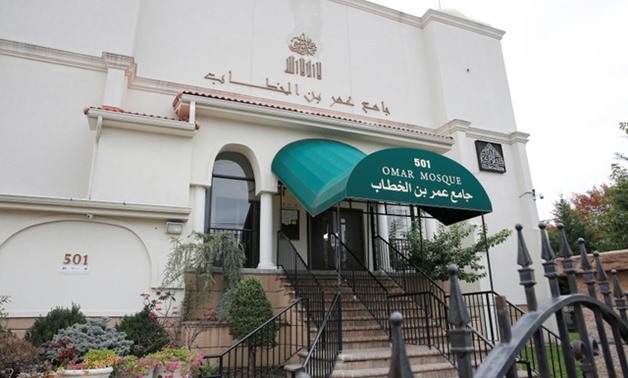
The mosque that according to local media Sayfullo Saipov, the suspect in the New York City truck attack attended in Paterson, New Jersey, U.S., November 1, 2017 - REUTERS/Ashlee Espinal
TASHKENT/ALMATY - 1 November 2017: An Uzbek immigrant accused of killing eight people in New York by driving a rental truck down a bike path became interested in religion after emigrating to the United States, a fellow Uzbek who spoke to him two months ago told Reuters on Wednesday.
Police said they had interviewed Sayfullo Saipov, 29, who was shot and arrested by police moments after the rampage in lower Manhattan on Tuesday.
He had entered the United States in 2010, police said. CNN, citing police officials, said he had left a note saying he carried out the attack in the name of Islamic State and had shouted "Allahu Akbar" - Arabic for "God is greatest."
"He became religious on the spur of the moment," Mirrakhmat Muminov, a truck driver and Uzbek community activist who lives in Stow, Ohio, told Reuters by phone. He said Saipov had previously lived in Tashkent, the capital of Uzbekistan.
"He started studying religion in the United States," said Muminov, adding that Saipov "couldn't get enough" of the religious freedoms enjoyed in the United States after living in the strict confines of Uzbekistan.
A Reuters reporter found Saipov's family home in Tashkent, a grey one-storey house, but nobody answered the door on Wednesday and a neighbour said his parents had left earlier in the day.
In Uzbekistan, an authoritarian, predominantly Muslim country in Central Asia ruled by Moscow until the collapse of the Soviet Union in 1991, the practice of Islam is tightly controlled by a government wary of radicalism.
Tuesday's attack shines an uncomfortable light on Islamist militancy in the wider region of Central Asia that has supplied Islamic State in Syria and Iraq with thousands of fighters. The rampage in New York was at least the fourth deadly attack by an Uzbek national or ethnic Uzbek this year.
A security source in neighboring Kyrgyzstan told Reuters Saipov had also lived there, receiving temporary identity papers in the town of Uzgen, which lies in the sometimes volatile Ferghana Valley, in 2004.
In the United States, Muminov said, Saipov had lived in Stow two or three years ago, they had met through the local Uzbek community, and Saipov had worked as a truck driver.
"AGGRESSIVE LONER"
Muminov said he had heard about the attack from Uzbeks in the Stow area some of whom he said were getting ready to be questioned by the authorities.
He said he had no first-hand information about whether Saipov had carried out the attack and painted a picture of a man who was struggling to make it in the United States, had few friends and poor communication and English-language skills.
"He was withdrawn, nervous, sometimes aggressive. Because of that he was lonely, he lived in his own world. He was not very popular,” said Muminov. He said Saipov's English was poor and he did not speak Russian very well. Muminov said he had last spoken to Saipov about two months ago.
Jahon, Uzbekistan's state news agency, said Saipov was born on Feb. 8, 1988 in Tashkent and had studied finance before taking a job as an accountant in a hotel in the city. It said he had no criminal convictions and had not "in general" caught the attention of the police.
Saipov had won a U.S. green (residence) card in a 2010 lottery and left for the United States that same year where he had later married an Uzbek woman living there, Jahon said.
He had not returned to Uzbekistan since 2010 or since seen his parents, who live in Tashkent and who the agency said practiced a "traditional" form of Islam and were not known to have any extremist links.
The state agency stressed how Saipov had not behaved suspiciously while living in Uzbekistan. "(But) after moving to the United States Saipov became withdrawn and fell under the influence of radical groups," Jahon said.
In a letter of condolence to President Donald Trump on Wednesday, Uzbek President Shavkat Mirziyoyev said Tashkent was ready to use "all its resources" to help investigate the New York attack.
It was the bloodiest single attack on New Yorkers since the Sept. 11, 2001, suicide hijackings of jetliners steered into the World Trade Center. It poses a challenge for Mirziyoyev, who assumed office at the end of 2016 and is trying to slowly open up his country after decades of authoritarian rule.
On New Year's Day, an Uzbek gunman burst into a nightclub in the Turkish city of Istanbul and killed 39 people. In April, an ethnic Uzbek man born in Kyrgyzstan blew up a metro train in the Russian city of St Petersburg, killing at least 14 people, and that same month an Uzbek man rammed a truck into a crowd in Stockholm, killing four people.


Comments
Leave a Comment